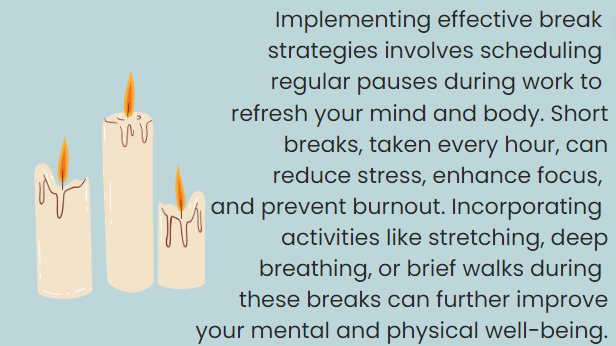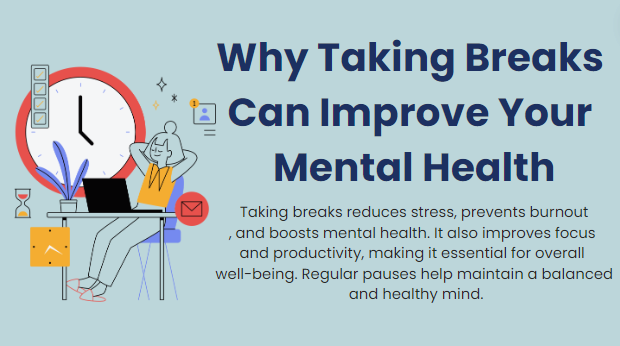In our fast-paced, always-on world, it’s easy to forget the importance of taking breaks. However, incorporating regular pauses into your daily routine can significantly boost your mental health and overall well-being. This article explores the various benefits of taking breaks and how they can positively impact your mental state.
The Science Behind Breaks and Mental Health
Research has shown that taking breaks can have a profound effect on our cognitive function and emotional well-being. When we allow our minds to rest, we give our brains the opportunity to process information, consolidate memories, and recharge for future tasks.
Key benefits of taking breaks:
- Reduced stress levels
- Improved focus and concentration
- Enhanced creativity
- Better emotional regulation
- Increased productivity
| Break Duration | Recommended Frequency | Potential Benefits |
|---|---|---|
| 5-10 minutes | Every hour | Improved focus, reduced eye strain |
| 15-20 minutes | Every 2-3 hours | Increased productivity, stress relief |
| 30-60 minutes | Once or twice daily | Enhanced creativity, improved problem-solving |
How Breaks Affect Mental Health
Stress Reduction
One of the most significant ways that breaks improve mental health is by reducing stress. When we’re constantly working or focusing on tasks, our bodies produce stress hormones like cortisol. Taking regular breaks allows these hormone levels to decrease, promoting a sense of calm and well-being.
Improved Cognitive Function
Giving your brain time to rest can actually improve your ability to think clearly and solve problems. This phenomenon, known as “cognitive restoration,” occurs when we step away from mentally demanding tasks and allow our minds to wander or engage in low-intensity activities.
Enhanced Emotional Regulation
Taking breaks can help us better manage our emotions. When we’re constantly pushing ourselves without pause, it’s easy to become overwhelmed or irritable. Regular breaks give us the opportunity to check in with our feelings and process emotions more effectively.

Types of Breaks That Boost Mental Health
Not all breaks are created equal. Different types of breaks can offer various benefits for your mental health. Here are some effective break ideas:
- Nature breaks: Spending time outdoors, even for a few minutes, can reduce stress and improve mood.
- Mindfulness breaks: Practicing meditation or deep breathing exercises can calm your mind and reduce anxiety.
- Physical activity breaks: Light exercise or stretching can boost energy levels and improve focus.
- Social breaks: Connecting with friends or colleagues can provide emotional support and reduce feelings of isolation.
- Creative breaks: Engaging in a hobby or artistic pursuit can stimulate different parts of your brain and enhance overall well-being.
| Break Type | Duration | Mental Health Benefits |
|---|---|---|
| Nature walk | 10-15 minutes | Reduced stress, improved mood |
| Meditation | 5-10 minutes | Decreased anxiety, better focus |
| Social chat | 10-15 minutes | Reduced loneliness, improved mood |
Implementing Effective Break Strategies
To maximize the mental health benefits of breaks, it’s important to implement them strategically. Here are some tips for incorporating effective breaks into your routine:
- Schedule regular breaks: Set reminders to take short breaks throughout your day.
- Disconnect from technology: Use break time to step away from screens and digital devices.
- Practice mindfulness: Focus on the present moment during your breaks, rather than worrying about work or responsibilities.
- Engage in enjoyable activities: Choose break activities that you find genuinely relaxing or energizing.
- Vary your break types: Mix up your break activities to keep them interesting and target different aspects of mental health.

Overcoming Guilt and Resistance to Taking Breaks
Many people feel guilty about taking breaks, viewing them as unproductive or indulgent. However, it’s important to recognize that breaks are essential for maintaining good mental health and long-term productivity. Here are some strategies to overcome break-related guilt:
- Reframe breaks as productivity tools
- Set clear break boundaries and stick to them
- Educate yourself on the science behind breaks and mental health
- Start with small, frequent breaks and gradually increase duration
- Track your productivity and mood to see the positive effects of breaks
The Role of Breaks in Preventing Burnout
Regular breaks play a crucial role in preventing burnout, a state of physical, emotional, and mental exhaustion often caused by prolonged stress. By taking breaks, you give yourself the opportunity to recharge and maintain a healthy work-life balance.
Signs that you may need more breaks:
- Feeling constantly tired or drained
- Experiencing frequent headaches or muscle tension
- Having difficulty concentrating or making decisions
- Feeling irritable or short-tempered
- Losing interest in activities you once enjoyed
| Burnout Risk Level | Recommended Break Frequency | Additional Self-Care Measures |
| Low | Every 1-2 hours | Regular exercise, healthy diet |
| Moderate | Every hour | Stress management techniques, hobby engagement |
| High | Every 30-45 minutes | Professional support, potential time off |
FAQs
How often should I take breaks?
It’s generally recommended to take a short break every hour, with longer breaks every 2-3 hours.
What if I don’t have time for breaks?
Even micro-breaks of 30 seconds to 1 minute can be beneficial. Try to find small pockets of time throughout your day.
Can breaks really improve my productivity?
Yes, research shows that regular breaks can actually increase overall productivity by improving focus and reducing fatigue.
What should I do during my breaks?
Choose activities that you find relaxing or energizing, such as stretching, deep breathing, or a short walk.
How do I know if I’m taking enough breaks?
Pay attention to your energy levels, mood, and ability to focus. If you’re feeling constantly drained or unfocused, you may need more frequent breaks.
Conclusion
Taking breaks is not a luxury; it’s a necessity for maintaining good mental health. By incorporating regular pauses into your daily routine, you can reduce stress, improve cognitive function, enhance emotional regulation, and prevent burnout. Remember that breaks are an investment in your long-term well-being and productivity. Start small, be consistent, and pay attention to the positive changes in your mental state as you make breaks a regular part of your life.
